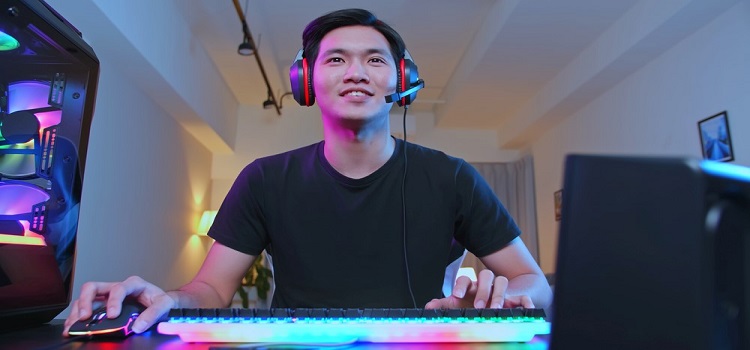
Source: aslysun/Shutterstock.com
Things To Consider While Bringing Your Gaming PC To College
Heading off to college is an exciting milestone for many young adults. It begins a new chapter filled with academic pursuits, social experiences, and personal growth. For avid gamers, one question that often arises is whether to bring their beloved gaming PC to college.
While having a gaming setup in your dorm room may sound like a dream come true, weighing the pros and cons before making the final choice is essential. Understanding what to consider can help you decide whether bringing your gaming PC to college is right for you.
1. Available Space and Housing
Dorm rooms and college apartments are typically modest, with limited space for personal belongings. Before bringing your gaming PC, assess the dimensions of your living area and whether it can accommodate your setup comfortably.
Consider the desk space required for your monitor, keyboard, and mouse, as well as the need for additional storage solutions to keep your gaming peripherals organized. Be prepared to face potential challenges in finding suitable storage for your gaming gear in a shared living environment.
2. Academic Priorities
The primary reason for attending college is academics. While gaming can be a fun and rewarding hobby, think about how having a gaming system with you might affect your studies. College demands considerable time and effort, especially for challenging majors like engineering, software design, or videography.
Bringing a high-powered desktop computer with a powerful processor can be smart if you anticipate dedicating most of your time to academic pursuits. If the system has ample storage, it can also be a beneficial resource for intensive tasks related to your major.
However, if you’re concerned that gaming might interfere with your studies, consider leaving the gaming PC at home and focusing on your academic goals.
3. Social Life and Relationships
College is a time for building social connections and fostering relationships. Excessive gaming can lead to isolation, depression, and anxiety, impacting your ability to socialize with peers. It’s essential to balance gaming and spending time with friends and roommates. Social activities can enrich your college experience and help you create lasting memories.
Use gaming to connect with others on campus by joining gaming clubs or communities where you can meet like-minded individuals. Take part in social events and get involved in campus activities to create a well-rounded college experience.
4. Financial Considerations
Bringing your gaming PC to college comes with financial considerations. You’ll need to factor in the cost of transporting and setting up your rig in your new living space. There’s also a risk of damage during transport, so take necessary precautions to protect your equipment. Gaming PCs may also require upgrades, repairs, and continuous maintenance, which can add to the expenses.
However, one advantage of a gaming desktop is the ease of switching out parts, making it more cost-effective for a college student in the long run compared to a laptop. Upgrading individual components can be more affordable than purchasing an entirely new system.
While there are initial costs and potential risks, carefully maintaining and upgrading your gaming PC can lead to a rewarding and budget-friendly gaming experience throughout your college years.

Source: Dean Drobot/ Shutterstock.com
5. Gaming Communities and Clubs
College campuses offer vibrant gaming communities and clubs that provide an opportunity to expand your gaming experience. Joining these clubs introduces you to diverse genres and styles, improving your gaming knowledge and skills.
Interacting with like-minded gamers fosters friendships and social connections. Participating in events and tournaments adds a healthy balance to your academic life, relieving stress and improving your overall college experience.
Bringing your gaming PC to college allows you to immerse yourself in this thriving gaming culture, creating cherished memories and lasting connections with fellow gamers who share your passion.
6. Portable Alternatives
If space constraints or portability are major concerns, consider opting for a gaming laptop or console. High-quality laptops for gaming are compact and mobile, allowing you to take your gaming experience anywhere.
They are designed for portability and versatility, making them a suitable option for college students on the move. Gaming consoles offer simplicity and convenience, eliminating the need for complex setups. Evaluate whether a laptop or console can meet your gaming needs without compromising your college experience.
7. Internet Quality and Connectivity
A stable and high-speed internet connection is essential for online gaming. Check the quality of internet services on campus and in your dormitory to ensure they meet the requirements for smooth gaming sessions. Lag and disconnections can negatively impact your gaming experience, especially in competitive online games.
If your internet quality is subpar, typically under 20 Mbps, it might be worth reconsidering bringing your gaming PC to college. However, if the campus provides reliable internet connectivity, it can improve your gaming experience and allow you to enjoy seamless online multiplayer gaming.
8. Health and Well-Being
While gaming can be enjoyable, consider the potential negative effects of prolonged gaming sessions on your health and well-being. Spending long hours in front of a screen can lead to eye strain, back pain, and other physical discomfort. Excessive gaming may also affect your sleep patterns and mental health.
Prioritize your well-being by incorporating regular breaks and physical activities into your routine. Set gaming boundaries and avoid playing late into the night to ensure you get enough rest and maintain a healthy balance between gaming and self-care.
9. Roommate Considerations
Living in a shared space requires compromise and respect for each other’s lifestyles. While you enjoy gaming, your roommate might have different priorities or prefer a quieter environment for studying or relaxation. Before bringing your gaming PC, have an open and honest discussion with your roommate about your gaming habits and how you can strike a balance that works for both of you.
Consider setting specific gaming hours or using headphones to reduce noise during late-night gaming sessions. Being considerate of your roommate’s preferences can help create a positive living environment and ensure a harmonious college experience for both of you.

Source: Stock-Asso/Shutterstock.com
Strike the Perfect Balance Between Gaming and Academic Success
Deciding whether to bring your gaming PC to college requires carefully considering space, finances, and gaming alternatives. Balance is key, ensuring that gaming doesn’t overshadow academic success or social experiences. Make a choice that enhances your college journey while maintaining a healthy gaming lifestyle.









